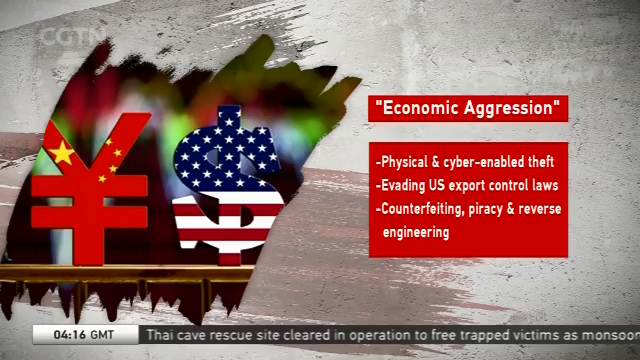
13:07, 08-Jul-2018
China-US Trade Tensions: White House accuses China of 'persistent economic espionage and aggression'
Updated
13:06, 11-Jul-2018
02:09

In June, the White House issued a report titled "How China's Economic Aggression Threatens the Technologies and Intellectual Property of the US and the World". But many have disagreed with the Trump administration's rhetoric against China's trade practices. WANG TONGXUAN has more.
The 35 page report was released by the White House a day after Trump threatened to slap additional tariffs on goods from China.
The document accuses Beijing of waging a systematic campaign of "economic aggression" that threatens US and global economic security.
The report says "economic aggression" includes physical and cyber-enabled theft of technologies and intellectual property, evading US export control laws, counterfeiting, piracy and reverse engineering. But it fails to give concrete facts and figures to support its claim.
So is China an economic aggressor? James Nolt, a visiting professor at New York University, believes that if China were engaged in predatory trade practices, then most of the countries that traded with it would have a huge trade deficit. He says, this is true of the United States but not others.
Instead, China's industrial modernization and economic growth offer abundant opportunities and returns for global investors. At the same time, contributing to the global economy.
World Bank President Jim Yong Kim said China has played an important role in global trade rebounding. It's growth accounts for nearly 30 percent of global growth.
IMF chief Christine Lagarde believes to achieve improved productivity, there needs to be trade.
She says, countries should resist the temptation for inward policies and protectionist sentiments to sustain sound economic growth.
Since January, the US has imposed additional tariffs which have drawn opposition from China, India, the EU, Canada and many other World Trade Organization members.
Many believe as history has shown, a Cold War mentality does not work.
WANG TONGXUAN, CGTN.

SITEMAP
Copyright © 2018 CGTN. Beijing ICP prepared NO.16065310-3
Copyright © 2018 CGTN. Beijing ICP prepared NO.16065310-3